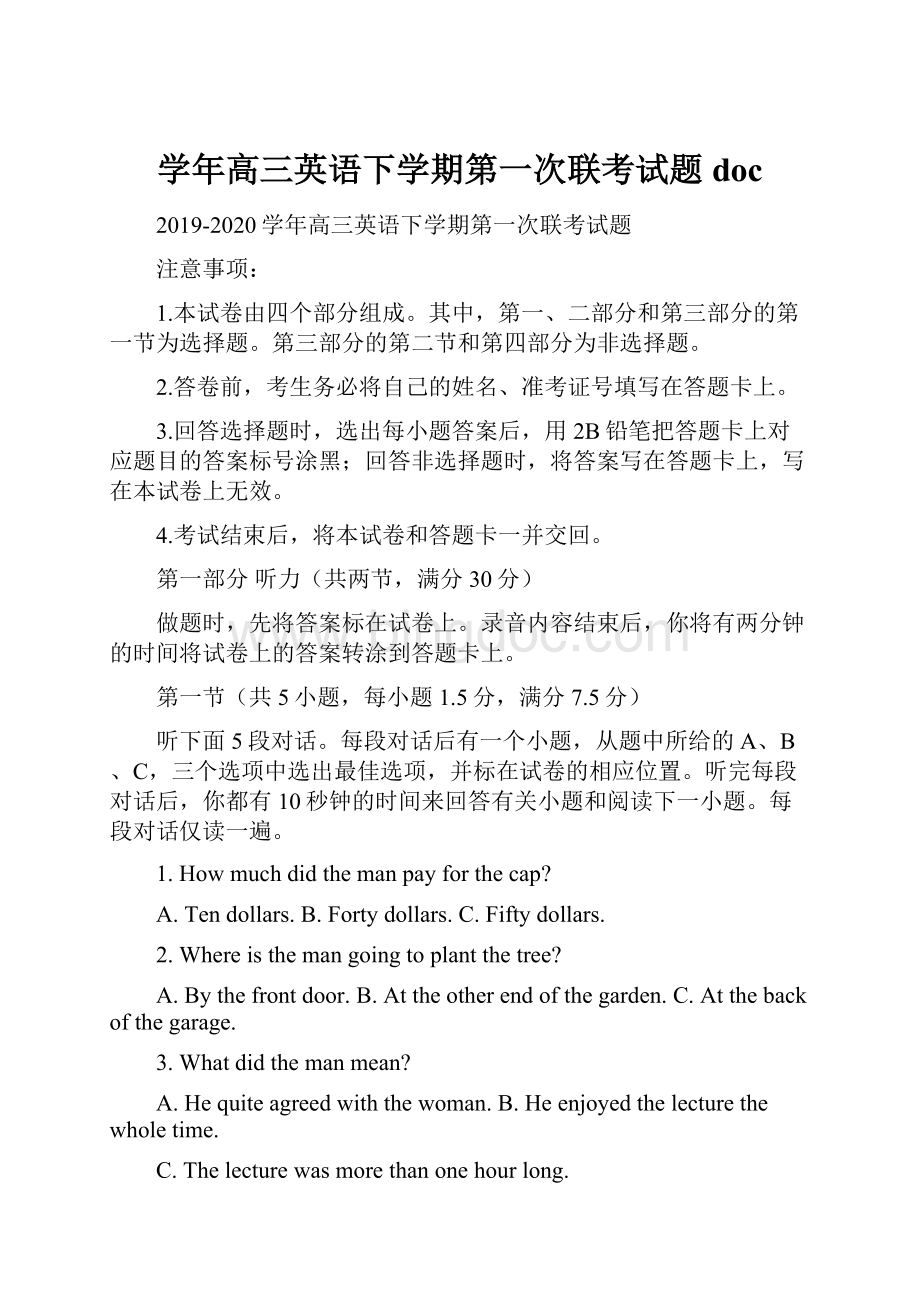学年高三英语下学期第一次联考试题doc文档格式.docx
《学年高三英语下学期第一次联考试题doc文档格式.docx》由会员分享,可在线阅读,更多相关《学年高三英语下学期第一次联考试题doc文档格式.docx(19页珍藏版)》请在冰点文库上搜索。

每段对话仅读一遍。
1.Howmuchdidthemanpayforthecap?
A.Tendollars.B.Fortydollars.C.Fiftydollars.
2.Whereisthemangoingtoplantthetree?
A.Bythefrontdoor.B.Attheotherendofthegarden.C.Atthebackofthegarage.
3.Whatdidthemanmean?
A.Hequiteagreedwiththewoman.B.Heenjoyedthelecturethewholetime.
C.Thelecturewasmorethanonehourlong.
4.Whatdoesthemanreallywanttodo?
A.Toreadtheadvertisement.B.Tomeetthemanager.C.Totakethejob.
5.What'
sthetimenow?
A.8:
30.B.9:
00.C.8:
00.
第二节(共15小题,每小题1.5分,满分22.5分)
听下面5段对话或独白。
每段对话或独白后有几个小题,从题中所给的A、B、C三个选项中选出最佳选项,并标在试卷的相应位置。
听每段对话或独白前,你将有时间阅读各个小题,每小题5秒钟:
听完后,各小题将给出5秒钟的作答时间。
每段对话或独白读两遍。
听第6段材料,回答第6至7题。
6.Whydoesthemanmakehisphonecall?
A.Tobuyatable.B.Toreserveatable.C.Tosellatable.
7.AtwhattimedoesMr.Millerwanttogo?
A.At7:
00.B.At9:
00.C.At8:
听第7段材料,回答第8至9题。
8.WhereisMr.Brown?
A.HeisintheSalesDepartment.B.Heishavingameeting.C.Heisbusy.
9.WhatisMr.Peterson'
stelephonenumber?
A.1300-621-7865.B.1300-612-7685.C.1360-620-7568.
听第8段材料,回答第10至12题。
10.HowlonghasArtbeenretired?
A.Abouttwelveyears.B.Aboutfiveyears.C.Abouteightyears.
11.WhatdidArtdo?
A.Hewasagolfer.B.Hewasabusinessman.C.Hewasapainter.
12.WhatdoesArtlikedoingmostnow?
A.Playgolf.B.Paintpictures.C.Makeglass.
听第9段材料,回答第13至16题。
13.Wheredoesthemanwanttogo?
A.TokyoSubwayStation.B.TokyoArtMuseum.C.TokyoTower.
14.Howmuchisthetrainfare?
A.130yen.B.140yen.C.150yen.
15.Whereshouldthemangetonthetrain?
A.Platformnumber3.B.Platformnumber4.C.Platformnumber5.
16.Howoftendoesthetraincome?
A.Abouteveryfiveminutes.B.Abouteverysixminutes.
C.Abouteverysevenminutes.
听第10段材料,回答第17至20题。
17.Whatisthenameofthecourse?
A.InterculturalCommerce.B.InteractioninCommunication.
C.InterculturalCommunication.
18.Whattimedoestheclassmeet?
A.3:
05p.m.to4:
15p.m.B.3:
15p.m.to4:
50p.m.C.3:
50p.m.to4:
50p.m.
19.Onaverage,howoftenwilltheclassmeetintheresearchlabduringthelastpartofthecourse?
A.Twiceamonth.B.Onceamonth.C.Threetimesamonth.
20.WhichitemwasNOTmentionedaspartofdeterminingastudent'
sfinalgradeintheclass?
A.Participation.B.Aresearchproject.C.Performanceinclass.
第二部分阅读理解(共两节,40分)
第一节(共15小题:
每小题2分,共30分)
阅读下列短文,从每题所给A、B、C、D四个选项中,选出最佳选项,并在答题卡上将该项涂黑。
A
TakeatriptooneofLondon'
sthemeparksforanadrenaline-packeddayout.Fromthrillingridesthroughhistory,towildanimals-bothmythicalandreal-London'
sthemeparksoffergreatentertainmentforfamiliesandgroups.
UnlikemostLondonattractions,someamusementparksaren'
tincentralLondon,butareeasilyreachedbytrain,coachorcar.
ChessingtonWorldofAdventures
Whetherit'
sadrenaline-pumpingrides,wildanimalsorunderwateradventuresyou'
reafter,Chessingtondelivers.Therearethreemainsections:
theThemeParkhas10themedlandswithmorethan40ridesandattractionsincludingrollercoasters,dodgemsandridessuitableforyoungerchildren.ChessingtonZoohouses1,000animalsincludingtigers,lions,giraffes,penguinsandapettingzoo.
Shrek’sAdventure
BoardtheDreamworks.TourBusfora4DexperiencewithcheekyDonkeyasyourguide.You'
llbetakenthrough10live,fairy–tale-themedshowsincludingShrek'
sSwampandamirrormaze(迷宫).Suitableforallages,butparticularlythoseaged6to12yearsold.
LondonDungeon
Takeascarybuthumorous90-minutejourneythrough1,000yearsofLondon'
shistoryattheever-popularLondonDungeon.Thereare18interactiveshowswith20livetheatreactorsandtworidestoguideyouthroughthecity'
smurkypast.WalktheWhitechapelMazewithJacktheRipper,visitamedievaltorturechamber,andbecarefulnottoloseyourheadonTheTyrantboatridewithKingHenryVⅢ!
KidZania
SetyourimaginationfreeatKidZaniaatWestfieldLondon-thenewrole–playingparkforchildrenthat'
stakingtheworldbystorm.Achild-sizecitycompletewithshopsandlocationsincludingafirestation,abankandatheatrestagewherechildrencanrole-playaround60differentjobsandprofessions,KidZaniaaimstoteachlifeskillssuchasfinancialliteracy,teamworkandindependence.
21.Ifvistorswanttoenjoytheexcitementofrollercoasters,theycangoto___.
A.KidZaniaB.Shrek'
sAdventure
C.LondonDungeonD.ChessingtonWorldofAdventures
22.WhomightbemostlikelyinterestedinLondonDungeon?
A.Studentsstudyinghistory.B.Underwateradventurers
C.Policeofficers.D.Animallovers.
23.Wheredoesthistextprobablycomefrom?
A.Asciencetextbook.B.Anewsreport.
C.Atravelguidebook.D.Ageographymagazine.
B
Manyofushavereachedinourpockets,feelingavibration(振动),wronglybelievingourmobilephoneshavejustrung.Thephenomenonevenhasaname:
'
phantomvibrationsyndrome'
-andfounditissurprisinglycommon.
Nowscientistsbelievethatwearesoalert(警觉)forphonecallsandmessageswearemisinterpretingslightmusclespasms(痉挛)asproofofacall.RobertRosenberger,anassistantprofessorattheGeorgiaTechInstituteofTechnologyhasstudiedthedelusionalcalls.Hesaidsufferersdescribeavaguetinglingfeelingwhichtheythinkistheirmobilephoneindicatingithasreceivedatextmessageorcallwhileon‘silent’.Butwhenthedeviceisretrieved,therewasnooneontheotherend.
Dr.Rosenbergersaid"
Ifindsomanypeoplesay,‘Thishappenstome,butIthoughtIwastheonlyone.IthoughtIwasodd."
Itseemsthatthesyndromeparticularlyaffectspeopleatthebeckandcallofmobilephonesorpagers.A2010studybyMichaelRothbergandcolleaguesfoundthatnearly70percentofdoctorsatahospitalinMassachusettssufferedphantomvibrations.AmorerecentstudyofUScollegestudentsfoundthefigurewasashighas90percent.
Whiletheoddfeelingiswidespread,itdoesnotseemtobeconsideredagraveproblem.Dr.Rosenbergersaid:
"
it'
snotactuallyasyndromeinatechnicalsense.That'
sjustthenamethat'
sgotstucktoit."
Headded:
Only2percentofpeopleconsideritaproblem.”
Whilewidespread,thescientificcommunityhasnotyetinvestedmucheffortingettingtothebottomofwhywesufferphantomcalls.
Dr.Rosenbergersaid:
Peopleareguessingithassomethingtodowithnervousenergy.Thecognitive(认知的)scientistsaretalkingaboutbrainchemistry,cognitivepathwayschanging.Butit'
snotliketheyhavebrainscanstogoon."
Hesaid:
Wehaveaphonecallinourpocketallthetimeanditbecomessortofanextensionofourselves.Wehavethissortofreadinesstoexperienceacall.Wefeelsomethingandwethink,OK,thatcouldbeacall.”
24.Whydosomepeoplemistakeslightmusclespasmsforacall?
A.Theyallhaveavividimagination.
B.Theyaresensitivetocallsandmessages.
C.Therearefewcallsandmessagesintheirlife.
D.Slightmusclespasmsaffectthemmorethanotherpeople
25.Whichofthefollowingaremorelikelytohavephantomvibrationsyndromethanothers?
A.Doctors.B.Universityprofessors.
C.Collegestudents.D.Thecognitivescientists.
26.InDr.Rosenberger'
sopinion,phantomvibrationsyndrome___.
A.isn'
takindofdiseaseactuallyB.isconsideredaproblembymostpeople
C.isaseriousproblemignoredbypeopleD.hassomethingtodowithbrainchemistry
27.Whatdoesthetextmainlytalkabout?
A.Mostpeoplehavephantomvibrationsyndrome.
B.Howtokeepawayfromphantomvibrationsyndrome.
C.Howtoreducephantomphonevibrations.
D.Peoplecaretoomuchaboutphantomphonevibrations
C
Sometimes,youjustcan'
thelpitMaybeyou'
rewatchingasadmovie,orthinkingaboutthefriendwhomovedaway.Nextthingyouknow,youfeelpressureinyourthroat,youreyesarewatering,andyouhavetearsrunningdownyourcheeks.
AccordingtoAdVingerhoets,aprofessorofpsychologyatTilburgUniversity,intheNetherlands,whoisoneofthefewscientistsintheworldwhohavestudiedcrying,therearethreetypesoftears.Basaltearsarethefirsttype.TheyactasaprotectivebarrierbetweentheeyeandtherestoftheWorld.Nextarereflextears.Theywashyoureyescleanwhensomethinggetsinthem.Finally,thereareemotionaltears.“Thesearereleasedinresponsetoemotionalstates,”explainsVingerhoets.
Scientistsbelievecryinghassomethingtodowithhowhumansdevelopedandlearnedtodependoneachother.“Humansareverycomplexsocialcreatures,”saysLaurenBylsma,aprofessorattheUniversityofPittsburgh,inPennsylvania."
Itseemsthattearsservetoarousehelpandsupportfromothers,”Shesays.
Vingerhoetsagrees,Ithinkthatthereasonwhyhumansshedtears(流眼泪)hassomethingtodowithourchildhood,"
hesays."
that'
sthetimewhenwearestilldependentonadultsforloveandprotectionandcare.Themajoradvantageofemotionaltearsisthatyoucantargetthemataspecificperson.“Vingerhoetssaysthisabilitycouldhavecomeinhandyinprehistorictimes,whenhumanswerelivingamongdangerousanimals.Tearswereasaferwaytogetattention."
Inthiscase,itisbettertouseasilentsignaltoaskforhelp,"
hesays.
VingerhoetsandByhmadofrequentstudiestobetterunderstandwhyhumanscry.AccordingtoByhma,thereisst